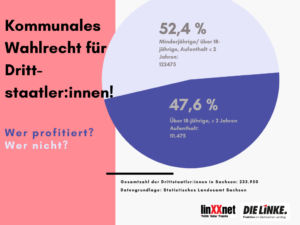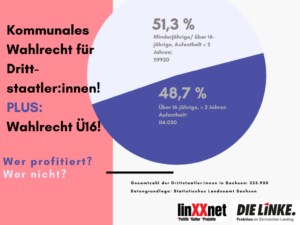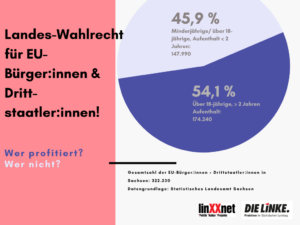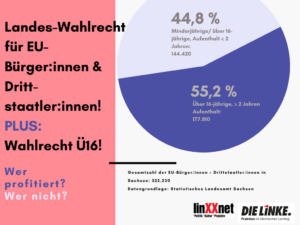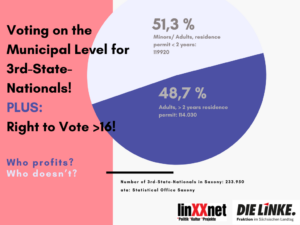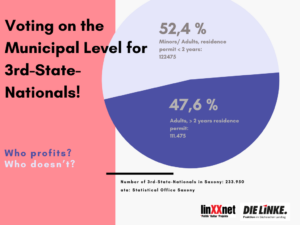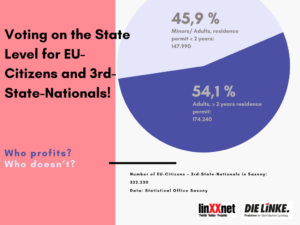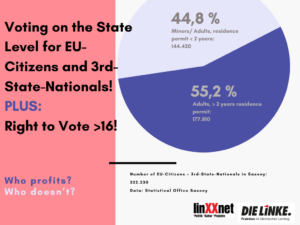Hier einige Stimmen zum Wahlrecht ohne deutschen Pass:
„Ich denke, dass es wichtig ist für diejenigen wählen gehen, die in der Heimat keine demokratischen Rechte genießen durften.“Francesca Russo, Ärztin, Co-Vorsitzende des Migrant:innenbeirats Leipzig
„Der Pass darf keine Grenzen zwischen denen sein, die wählen dürfen oder nicht. Für alle, die sich über die Zukunft Gedanken machen, ist das Wahlrecht wichtig!“Mariami Gvinjilia, Mitarbeiterin der AG-Asylsuchende Sächsische Schweiz/ Osterzgebirge
„Die Menschen zahlen hier Steuern. Und wer bezahlt, darf auch mitbestimmen, was mit dem Geld passiert.“Mohammed Okasha, Co-Geschäftsführer, Co-Vorsitzender des Migrant:innenbeirats Leipzig
Wer würde davon profitieren?
Auf Landesebene wiederum sind beide Personengruppen ausgeschlossen. Wenn das geändert wird, können so viele Menschen wählen:
Zuviel Text? :)
Hier stellt Jule den Antrag kurz und bündig vor!
Kommune, Land… und der Bund? – Petition „Passt uns allen!“
- Die deutsche Staatsangehörigkeit für alle Menschen, die in Deutschland geboren sind.
- Das Recht auf eine unbürokratische und kostenlose Einbürgerung für alle Menschen, die seit mindestens drei Jahren ihren Lebensmittelpunkt in Deutschland haben.
- Die Möglichkeit, mehrfache Staatsangehörigkeiten zu besitzen.
- Das aktive und passive Wahlrecht auf Bundes-, Landes- und kommunaler Ebene für alle Menschen, die ihren Lebensmittelpunkt seit mindestens drei Jahren in Deutschland haben.
Warum Reformen bei Einbürgerungen und beim Wahlrecht notwendig sind, erläutern vor allem Francesca und Mariami in ihren Videobeiträgen. Die Petition und den gesamten Text mit den Forderungen an die Bundesregierung hier.
Right to Vote! An Initiative for Voting without German Passport
In 2022 around 322.230 people without german citizenship lived in Saxony. These people cannot vote, although they are directly affected by decisions at the local, state and federal level. An exception are EU citizens, who at least have the right to vote in local and European elections.
We live in an immigration society. It is time to decouple citizenship and participation rights: everyone who has their centre of life here should be able to vote. Migrant organisations and civil society initiatives have been fighting for this for a long time.
With a current motion, we call on the Saxon government to become active and to campaign at the federal level for voting rights in local and state elections for people without a German passport who have lived here for at least two years (Link to the initiative: „Introduce voting rights for people from non-EU countries living permanently in the Federal Republic of Germany: Create a legal basis at federal level! Drs 7 13385)
It has been 33 years since the Federal Constitutional Court ruled against a right to vote for foreigners.Since then, the social reality has changed fundamentally.People who come to Germany usually stay here.Not all of them take the step of becoming German citizens. It is time to talk distinctively about the right to vote for people without a German passport and to shake up the concept that the right to vote is linked to citizenship.The right to vote for EU citizens, which was introduced in 1992, shows that this is possible.In addition, third-country nationals can vote in local elections in more than half of the EU member states.
We consider the right to vote for people without a German passport together with a lowering of the voting age to 16. This would allow 114,030 more people in Saxony to vote in local elections and 177,810 in state elections.
People who have lived here for many years, who also pay taxes here and who, above all, are affected by political decisions, should have the opportunity to participate in democratic elections. The right to vote or stand for election is a fundamental principle of democracy.
Here some voices on the right to vote without German passport:
„I think it is important that those have the right to vote who were not having democratic rights in their home countries.“Francesca Russo, Doctor, Co-Chair of Migrants‘ Council Leipzig
„The passport shouldn’t mark a border between those who can vote and those who cannot. For everyone who cares about the future, the right to vote is important!“Mariami Gvinjilia, Employee at AG-Asylsuchende Sächsische Schweiz/ Osterzgebirge
„The people here pay taxes. And who pays shall participate in the decision on what is going to happen with the money.“Mohammed Okasha, Co-Executive Director, Co-Chair of the Migrants‘ Council Leipzig
Too much to read? :)
Here, Jule briefly introduces the parliamentarian initiative:
Who would profit?
On the state level, both people are excluded so far. If that gets changed, that many people are eligible to vote:
City, State… and the federal level? Petition „Passt uns allen!“
- German citizenship for everybody who is born in Germany.
- The right to an unbureaucratic and free of charge naturalisation of people who have their centre of life in Germany for at least three years.
- The possibility to possess multiple citizenships.
- The active and passive right to vote on the federal, state and municipal level for all people who have their centre of life for at least three years in Germany.
Why reforms concerning citizenship as well as the right to vote are important, is explained by Francesca and Mariami. The petition and the whole text with the demands addressing the federal government here.


